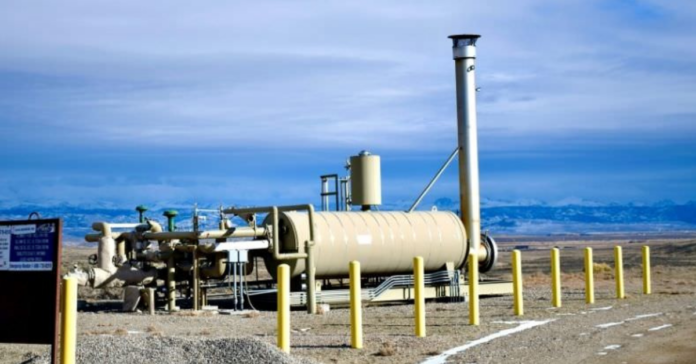Plans to repeal a last-minute Obama administration rule targeting oil and natural gas development on public and tribal lands are winning the support of tribal, business and local leaders in Colorado.
The methane regulation, finalized by the U.S. Bureau of Land Management (BLM) after the 2016 election, has been controversial across the West. Three states – Wyoming, Montana and North Dakota – have sued to stop the “venting and flaring” rule. Western officials are also leading an effort to repeal the methane regulation using the Congressional Review Act (CRA) as part of a broader regulatory reform push.
Methane is the primary constituent of natural gas and the BLM argues the rule prevents waste. But critics of the rule say it imposes overlapping and damaging restrictions on oil and natural gas development on public and tribal lands. Emissions from oil and gas development are already regulated under existing state and federal programs, and higher costs from the extra red tape will harm local economies that depend on energy production, they argue.
Existing regulations “already protect air quality” and the BLM’s methane rule should be abolished, Clement Frost, chairman of the Southern Ute Indian Tribe, said in a statement to Western Wire. The Tribe, located in southwest Colorado, develops oil and natural gas. The new restrictions pose a threat to the local economy and to funding levels for essential services, Frost said.
“If the rule is not overturned, it will increase … costs of compliance,” he said. “Low commodity prices and existing high regulatory compliance costs already are negatively impacting energy development on the Southern Ute Indian Reservation.”
“The Tribe relies on revenues from Reservation energy development to fund important government services,” Frost said. “BLM’s rule is unnecessary and would further negatively impact the Tribe’s energy development revenue.”
In a Jan. 27 letter to House Speaker Paul Ryan (R), Frost endorsed the CRA disapproval measure, which is expected to get a vote in the U.S. House this week. If it passes the House and Senate, and is signed by the president, the BLM methane rule would be struck down.
Frost also rejected efforts to paint the measure as anti-environment. “[T]he Tribe and our members have long held the view that air quality – and a clean environment in general – are values we hold dear,” he said in the letter to Ryan.
In Colorado, “the oil and gas industry is already the most regulated of any state,” Leah Curtsinger, director of federal policy for the Colorado Association of Commerce and Industry (CACI), told Western Wire. “Continuing to implement the BLM’s venting and flaring rule will negatively affect our restaurants, hotels, home builders, lenders, the companies who supply mechanics and parts, as well as the farmers and ranchers reliant on royalties to supplement incomes,” Curtsinger said.
The Denver-based group “supports the CRA efforts to roll back the BLM’s venting and flaring rule” because it wasn’t approved by Congress and adds “high-cost compliance and heavy-handed government regulations” to one of Colorado’s most important economic sectors.
Methane, or natural gas, is a valuable commodity. But energy producers are sometimes forced to flare or vent some natural gas “for both safety and environmental reasons,” according to the U.S. Energy Information Administration. Even so, the approval and construction of new natural gas pipelines has dramatically reduced venting and flaring in states like North Dakota, the EIA says.
But new pipeline projects have been obstructed by the Sierra Club, the Center for Biological Diversity and other “keep it in the ground” activist groups that oppose all development of oil, natural gas and coal. The same groups lobbied the Obama administration to ban oil, gas and coal production on federal lands and called the BLM’s methane rule “a positive step” towards ending fossil-fuel production on public lands completely.
Critics of the BLM rule, including Montana Congressman Ryan Zinke (R) – nominated to serve as the nation’s next Interior Secretary – and New Mexico Gov. Susana Martinez (R), have said building more pipeline capacity on federal lands would be a more effective way to curb methane emissions than an additional layer of federal regulation.
Rio Blanco County Commissioner Shawn Bolton (R) told Western Wire he supports the effort in Congress to repeal the BLM methane rule because “the cost of this rule far outweighs any benefit that we could possibly get out of it.”
Seventy-five percent of the Colorado county he represents is public land “and 85 percent of our tax revenue comes from the extraction industry in one form or the other,” he said. Bolton also serves as the chairman of the public lands committee of Colorado Counties Inc., a non-profit group representing local leaders from across the state.
“Regulation is just getting out of control,” Bolton said. “There’s less and less incentive for these companies to want to drill on BLM land.” The problem is bigger than just the BLM venting flaring rule, he said, but repealing the regulation “would definitely be a step in the right direction.”

